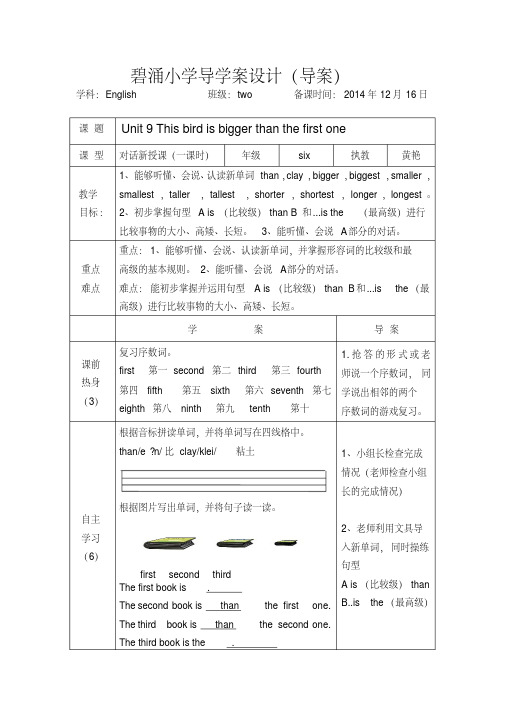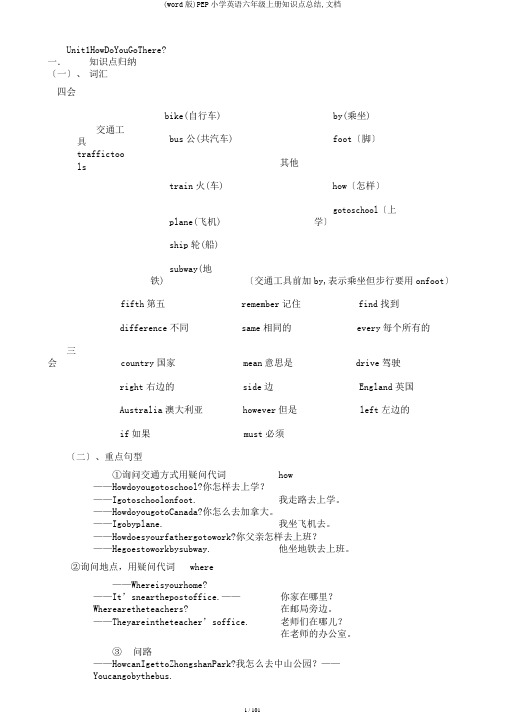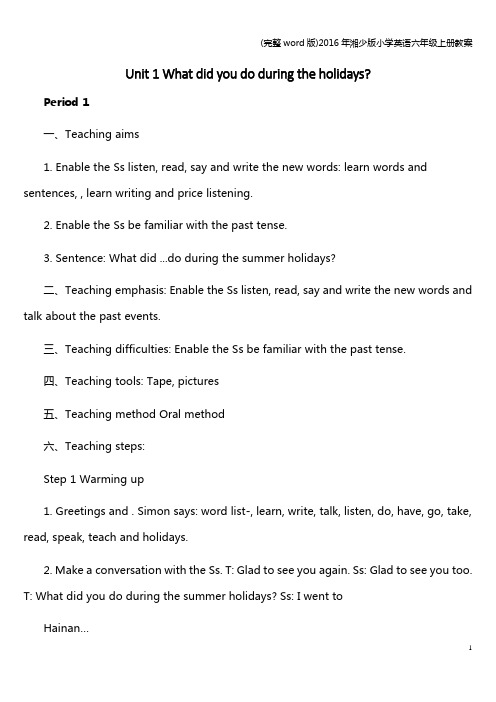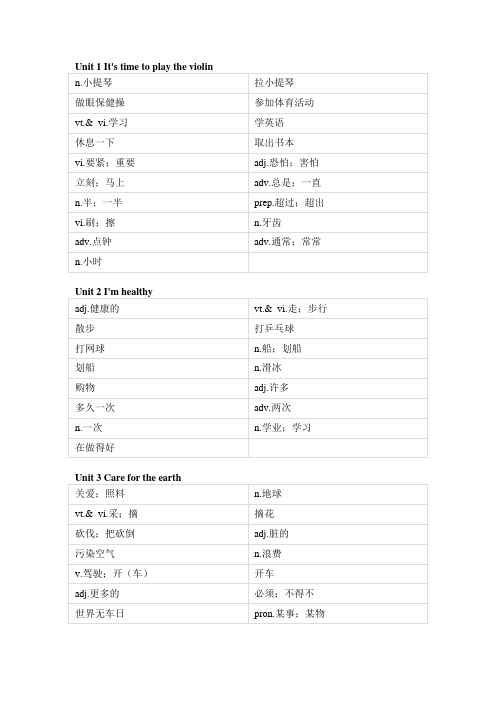(完整word版)湘鲁版六年级英语上册重点语句
- 格式:docx
- 大小:16.63 KB
- 文档页数:4

碧涌小学导学案设计(导案)学科:English 班级:two 备课时间:2014年12月16日课题Unit 9 This bird is bigger than the first one课型对话新授课(一课时)年级six 执教黄艳教学目标:1、能够听懂、会说、认读新单词than,clay,bigger,biggest,smaller,smallest,taller,tallest,shorter,shortest,longer,longest。
2、初步掌握句型 A is(比较级)than B和...is the(最高级)进行比较事物的大小、高矮、长短。
3、能听懂、会说A部分的对话。
重点难点重点:1、能够听懂、会说、认读新单词,并掌握形容词的比较级和最高级的基本规则。
2、能听懂、会说A部分的对话。
难点:能初步掌握并运用句型 A is(比较级)than B和...is the(最高级)进行比较事物的大小、高矮、长短。
学案导案课前热身(3)复习序数词。
first第一 second第二 third第三 fourth第四 fifth第五 sixth第六 seventh第七eighth第八 ninth第九 tenth第十1.抢答的形式或老师说一个序数词,同学说出相邻的两个序数词的游戏复习。
自主学习(6)根据音标拼读单词,并将单词写在四线格中。
than/e?n/比 clay/klei/粘土根据图片写出单词,并将句子读一读。
first second thirdThe first book is .The second book is than the first one.The third book is than the second one.The third book is the .1、小组长检查完成情况(老师检查小组长的完成情况)2、老师利用文具导入新单词,同时操练句型A is(比较级)thanB..is the(最高级)合作交流展示(20)一、听录音,判断对错。

Unit1HowDoYouGoThere? 一.知识点归纳〔一〕、词汇四会交通工具traffictoo lsbike(自行车)by(乘坐)bus公(共汽车)foot〔脚〕train火(车)其他how〔怎样〕plane(飞机)gotoschool〔上学〕ship轮(船)subway(地铁)〔交通工具前加by,表示乘坐但步行要用onfoot〕fifth第五remember记住find找到difference不同same相同的every每个所有的三会country国家mean意思是drive驾驶right右边的side边England英国Australia澳大利亚however但是left左边的if如果must必须〔二〕、重点句型①询问交通方式用疑问代词how——Howdoyougotoschool?你怎样去上学?——Igotoschoolonfoot. 我走路去上学。
——HowdoyougotoCanada?你怎么去加拿大。
——Igobyplane. 我坐飞机去。
——Howdoesyourfathergotowork?你父亲怎样去上班?——Hegoestoworkbysubway. 他坐地铁去上班。
②询问地点,用疑问代词where——Whereisyourhome?——It’snearthepostoffice.——Wherearetheteachers? ——Theyareintheteacher’soffice.你家在哪里?在邮局旁边。
老师们在哪儿?在老师的办公室。
③问路——HowcanIgettoZhongshanPark?我怎么去中山公园?——Youcangobythebus.你可以坐一路车去。
YoucantaketheNo.1bus.④交通规那么(trafficrules)Stop ataredlight.红灯停Wait atayellowlight.黄灯停Goat agreenlight.绿灯行InChinaandtheUS,driversdriveontherightsideoftheroad.在中国和美国,司机靠右行驶。

鲁科版六年级上册英语unit4,重点句子鲁科版六年级上册英语Unit4的主题是“喜好”,通过本单元的学习,学生们可以熟练运用以下重点句子进行交流。
首先,我们来解析一下这些句子的结构和含义。
句子1和2:“What do you like?”和“I like apples.”这是一组简单的问答句,用来了解对方的喜好。
例如,你可以问你的朋友:“你喜欢吃什么?”朋友回答:“我喜欢吃苹果。
”接下来是句子3和4:“Do you like oranges?”和“Yes, I do.”这是另一组问答句,用来询问对方是否喜欢某物。
例如,你可以问:“你喜欢橙子吗?”朋友回答:“是的,我喜欢。
”句子5和6:“What about you?”和“I like them too.”用于回应别人的提问,表示自己也喜欢同样的事物。
当你问朋友:“你喜欢苹果吗?”朋友回答:“你呢?”你回答:“我也喜欢。
”句子7至10:“How do you feel?”、“I feel happy.”、“Are you tired?”和“Yes, I am.”这些句子用来表达自己的感受。
例如,你可以问:“你感觉怎么样?”朋友回答:“我感觉开心。
”或者:“你累了吗?”朋友回答:“是的,我累了。
”在实际生活中,我们可以运用这些句子进行情景对话。
例如,你和同学在课间休息时,可以这样交流:你:“你喜欢吃什么?”同学:“我喜欢吃巧克力。
”你:“哦,我也喜欢吃巧克力。
你呢?”同学:“我也喜欢吃巧克力。
”此外,还可以通过这些句子来描述家庭成员的喜好。
例如,你可以说:“我妈妈喜欢逛街,我爸爸喜欢看电影,我喜欢玩游戏。
”总之,在学习Unit4的过程中,学生们不仅可以掌握这些实用的句子,还可以在日常生活中灵活运用,提高自己的英语表达能力。

Unit 1 What did you do during the holidays?Period 1一、Teaching aims1. Enable the Ss listen, read, say and write the new words: learn words and sentences, , learn writing and price listening.2. Enable the Ss be familiar with the past tense.3. Sentence: What did ...do during the summer holidays?二、Teaching emphasis: Enable the Ss listen, read, say and write the new words and talk about the past events.三、Teaching difficulties: Enable the Ss be familiar with the past tense.四、Teaching tools: Tape, pictures五、Teaching method Oral method六、Teaching steps:Step 1 Warming up1. Greetings and . Simon says: word list-, learn, write, talk, listen, do, have, go, take, read, speak, teach and holidays.2. Make a conversation with the Ss. T: Glad to see you again. Ss: Glad to see you too. T: What did you do during the summer holidays? Ss: I went toHainan…Step 2 Presentation and drill1. Show the picture of “learn words and sentences”. T: This is a picture of Mingming during the summer holidays. What did he do? Ss: He is learning words and sentences.T: He is not doing it now. He learnt words and sentences during the summer holidays.2. Learn the other words in the same way.3. Read together.4. Little teacher.Step 3 PriceT: He learnt words and sentences. They ed . She learnt writing. He practised listening. (Action) learn words and sentences, play games, learn writing and practice listening…3. The Ss act and say.4. Listen to the tape of Part A and then answer these questions. What Anne do during the summer holidays? What did Mingming do during thesummer holidays? 3. Listen and repeat.5. Act it out.Step 4 Consolidation 1. Evaluation. 2. Do Ex. 3.Homework. Copy the new words.Design of the blackboard:Period 2一、Teaching aims:1. Enable the Ss listen, read and say the dialogue;2. Enable the Ss the sentence pattern: What you do during theholidays?3. Enable the Ss master read the short passages and judge True or False.二、Teaching emphasis: Enable the Ss listen, read and say the dialogue;三、Teaching difficulties: Enable the Ss master the sentence pattern: What did you do during the holidays?四、Teaching tools: Tape, pictures五、Teaching method Oral method六、Teaching steps:Step 1 Warming up1. Greetings.2. Act and say. 1). (Action) learn words and sentences, , learnwriting and price listening… 2). Tom: I played games. Ss: Tom playedgames. …Step 2 Presentation and drill 1. Listen to the tape and learn the Word Bank. What you do during the holidays? I read many books. I visited mygrandparents. I played games with my friends.Step 3 Practice1. Listen to the tape and repeat.2. Pair-work.3. Group-work .Step 4 Let’s Read1. Read the short passage and then judge True or Flase.2. Read the passage again and underline the key sentences.3. Check the answers.Step 5 Consolidation1. Evaluation.2. Do Ex3. Homework.Design of the blackboard:Period 3一、Teaching aims:1. Enable the Ss talk about their holidays.2. Enable the Ss and write down their holidays.二、Teaching emphasis: Enable the Ss describe their holidays.三、Teaching difficulties: Enable the Ss to talk about and write down their holidays四、Teaching tools: Tape五、Teaching method Oral method六、Teaching steps:Step 1 Warming up1. Greetings.2. Read Part A together.3. Step 2 Presentation and drill1. Ask students to talk about their summer holidays and then let them finish Part E: write down your answers2. Check the answer.3. Ask two Ss to talk about their answers.Step 3 Let’s Have Fun1. Class work. Look at the pictures, describe Mingming’s and Anne’s holidays.2. Class work. describe your holidays.Step 4 Consolidation1. Do Ex. Workbook Unit 1.2. Evaluation3. Homework. Revise Unit 1.Design of the blackboard:Unit2 Katie always gets up early.Period 1Teaching aims.1.The aims of knowledge:Learn these new words: wake up; make the bed; wave; late always; usually; often; never.2.The aims of skills:a. Ss can understand the four –skill words: wake up; make thebed; wave; lateb. Ss can understand the words: always; usually; often; never.c. Ss can describe the other’s actions.3.Emotion, attitudes and valueTo form the health living habitMain points and difficult point:The students master the words: wake up; make the bed; wave; late; always; usually; often; never.Teaching method and Learning way:TPR; Task-based method; Discussing Teaching aids : Cards, tape ,record, pictures Teaching Process: Step 1 Warming up a. Greetings.b. sing a song: London Bridge is falling downc. Free talk. Talking about my day.Step 2 Reviewa. Game—Guess ,guess, guessUse the cards to go over the wordsb. Retell the story—Unit 1Step 3 Presentationa. Learn the words and expressions:wake up; make the bed; wave; late At first show the learned word: cake .Let the studentsread the word, then write the words carefully.From above to find out the rules of pronunciation and memory words.Wake up.e.g. a. What time do you usually wake up?b. I usually wake up at 6.make the bede.g. a. Do she make the bed in the morning?b. The first thing he does after getting up is to makethe bed.wave a greeting挥手致意late.e.g. I’m latelate autumn暮秋, 深秋get up late睡懒觉wave good-bye to sb. 挥手告别b. Let the students understand frequency Adverbs(频率副词):always often usually never alwaysRead these words several times and try to remember them. At the same time, explain the meanings of different adverbs of frequency.100% always I always stay at home in the evenings.90% usually I usually wake up early.80% often He often goes to school on foot.0% never He never goes to school late.Step 3. PracticePractice the words. a. Game 1. Loud and low voice. b. Game 2. Quick response The teacher brings out some pictures and word cards, the students speak out the words quickly.c. Game 3. Guessing gameWriting on blackboard:Period 2Teaching aims:A. Knowledge and skillsa. Learn Part A Let’s listen and say. Katie’s Day.b. Grasp the usage of adverbs of frequency. B. Processes and methodsa. With the studying strategies, get the students to work in pairs or groups to talk about their day.b. Let the students practice speaking and writing. C. Emotion, attitudes and valueget-gets make-makes wash-washes run-runs leave-leaveshave-hasb. Ss can master sentence structure: sb do sth at some time Teaching method:Task-based Learning MethodTeaching aids:Cards, recorder and some objectsTeaching Process: Step 1 Warming up a. Greetings.b. sing a song Step 2 ReviewGame—Golden finger Use the cards to go over the wordsStep 3 Presentation and drilla. Listening to the recorderb. T: You’re very good. You are all good pupils. And Katie is a good pupil too. Everyone likes her. She is never late for school. She always gets up early every day . Then she makes bed .after breakfast, she waves her family goodbye.c. Fast reading the text.d. Answer the following questions.Does Katie always gets up early?What time does Katie wash her face?What time does Katie make her bed?Is Sally is often late?What time does Katie’s fathe r leave for work? e. Explain the grammar for the pupils: The present tense of the third person. get-gets make-makes wash-washes run-runs leave-leaves have-hasStep 4 Practicea. Reading the text carefully.b. Listen and repeat itc. Retell it , check the resultd. Practice in pairs, according to the form to saysomething about their day.Step5 Consolidationa. Part C About the story.Put a tick(√)if the sentencescorrect of a cross(×)if they are wrong.1. Katie always gets up at six o’clock. (√)2. Katie alw ays washes her face at 6:15 am. (×)3. Katie’s family often has breakfast at 6:45 am. (×)4. Sally always goes to the breakfast table on time. (×)5. Katie’s father usually waves then goodbye. (√)b. Homework: Listen and read the dialogue, copy the new wordsWriting on blackboard:Unit2 Katie always gets up early.get –gets make – makes wash - washesrun – runs leave - leaves have - has Period 3Teaching aims.a. Going over words.b. Retell the story.Main points:Finish Part D, E, F. The students can master the words and sentences.Difficult point: Teaching aids:Teaching Process:Step 1 Warming upa. Greetings.b. Sing a song.Step 2. Reviewa. Play a game –magic eyes The students can describe the other’s actions cards,tape ,record c. Free talk: Say something about your daily life Going over the learned words: slide, bench, bark, chain, swing, stone, bite, wake up, make the bed, have, late.always, usually, often, never.b. Use the cards to go over the new dialogue ,and make sentences with the present tense ,they are required not to make the same sentencesc. Retell the storyStep 3 Drillsa. Part D. Pair work. Look at the chart. Take turns to tell each other about Peter’s activities.Example: Peter usually goes to bed at ten o’clock.Write four sentences about your activities.2、I never go to school by bus.Exemple: I usually do my homework at six o’clock.3、I often watch TV at 6: 30 in the evening.114、I usually go to bed at 10:00 pm.b.Part E Listen to the tape and requires them to finish12Now, write suitable answers in the blanks.3.Listen to tape and follow itStep 4 Consolidationa. Make a situation and have a dialogue with their partners, choose some to act it outb. Homework: Listen and read the dialogue, copy the words ,and try to recite textWriting on blackboard:Unit3 I like my computerperiod 1Teaching aims:1.Enable the Ss grasp the phrases like: email my friends, send greetings, search fora lot of things, find out about countries2.Enable the Ss grasp the sentences like: I like my computer; We can email our friends/send greetings/search for a lot of things/find out about countries... on the computers.3.Ss can act the dialogue.Main points: Enable the Ss grasp the phrases.Difficult point: Enable the Ss grasp the sentences.Teaching method:CAI, pictures, word cards a nd tape.Teaching Process:Step1 Warming-up1.Greetings.2. Free talk.Step2 Presentation & Drills1.Lead-in: Talk about computer.T: Boys and girls, I have a good friend. He always helps me do many things. Can you guess, who is he? (show the picture: computer.)T:Yes,It’s my computer. It’s my friend. I like my friend. I like my computer.(write on the blackboard)2.New phrases and new sentences(1) Learn the new phrases in Part B.email my friendssend greetingssearch for a lot of thingsfind out about countries(2)Sentencesa. (show the phrases cards)Let Ss read them.b. T:What ca n we do on the computers?(talk in group)We can…on the computers.3.The dialogueThen introduce the listening text: Yesterday was Peter’s birthday. He’s father bought him a computer for his birthday. Peter was happy. He could do a lot of things with his computer.(1)Listen and watch.学生观看视频.Then answer the question :What could Peter do on the com puter? (2)Listen and read.打开书,跟磁带读,模仿语音语调。


Unit 1. 复习清单I.单词必做:课本单词unit1(P95) 拓展:1.good adj. 好的;健康的fine adj. 好的;健康的well adv.好地2.bad adj.坏的3.thankful adj.感激的4.want v.想要5.breakfast n. 早餐6.hungry adj. 饥饿的7.lunch n.午餐8.supper n.晚餐9.letter n.字母10.nice adj.好的亲切的11.beautiful adj.漂亮的12.HB( Hard Black)硬黑13.CD(Computer Disc)激光唱片14.NBA(美国)全国篮球协会15.kg(kilogram)千克;公斤16.P(Parking)停车场;停车位17.S(Small)小号的18.M(Middle)中号的19.L(large)大号的20.UFO(不明飞行物TV中国中央电视台II.短语(必做)1.good morning早上好2.good afternoon下午好3.good evening晚上好4.good night 晚安5.in the morning在早上6.in the afternoon在下午7.in the evening在晚上8.at night在晚上9.thanks for= thank sb for因为…而感谢III.句子1.Hello!/Hi! 你好!2.Nice to meet you! 很高兴见到你!3.Nice to meet you, too! 我也很高兴见到你!4.Good morning, Helen! 早上好,海伦!5.Good afternoon, Eric! 下午好,埃里克!6.Good evening, Bob! 晚上好,鲍勃!7.Good night, Mike! 晚安,迈克!8.How are you? 你好吗?9.I’m fine, thanks. And you? 我很好,谢谢,你呢?!10.Thanks for your help.谢谢你的帮忙。
六年级上册英语重点知识笔记第一版本Unit1 How can I get there ?一、主要单词:museum博物馆bookstore书店cinema电影院turn 转弯hospital医院left向左post office 邮局science科学right向右straight笔直地crossing十字路口二、习惯语搭配:postoffice邮局science museum科学博物馆pethospital宠物医院Italian restaurant意大利餐馆Beihai Park北海公园Palace Museum故宫博物院gostraight直走turn right/left右/左转next to挨着in front of...在...前面near the park在公园附近onDongfang Street在东方大街上三、惯用表达式:Excuseme 打扰一下Follow me, please!请跟着我!四、公式化句型:1、问路的句型及其答语:问句:Where is the + 地点?······在哪儿?答语:It's + 表示地点的词语(next to the bookstore, near the hospital/post office, over there,on Dongfang Street, infrontof the school... )2、询问怎么到某地的句型及其答语:问句:How can +主语+ get (to)+地点?·····怎么到·····?同义句型:Can you tell me the way to +地点?Whereis + 地点?Which is the way to +地点?五、例句:Whereis the cinema, please? 请问电影院在哪里?It'snext to the hospital. 它与医院相邻。
Unit 1 How can I get there?一、重点单词和短语(1)science museum科学博物馆post office邮局bookstore书店cinema电影院hospital医院restaurant餐馆bank银行bus stop公交车站lake湖library图书馆crossing十字路口school学校park公园garden花园hotel旅馆zoo动物园(2)turn left向左转turn right向右转go straight直走near在…附近next to紧挨着/ 与…相邻far from 离…远behind在…后面in front of在…前面between…and…在…和…之间二、按要求写单词hot(反义词)cold cool(反义词)warm too(同音词)to/twosea(同音词)see can not(缩写)can't right(反词)left/wrongbuy(同音词)by/bye first(基数词)one four(序数词)fourthdid (原形)do /does three(序数词)third三、重点句型分析1. Where is the museum shop? 2。
It’s near the park.3。
How can we get there?询问“怎样去某地”Turn left at the bookstore. Then turn right at the hospital。
5。
Is the hospital far from here? Yes, it is。
/ No,it isn't。
Unit 2 Ways to go to school一、重点单词和短语on foot步行by bus =take a bus乘公交车by plane乘飞机by ship乘船by taxi 乘出租车by subway 乘地铁by train乘火车by bike骑自行车slow down 慢下来stop and wait停下来等pay attention to注意cross the road横穿马路traffic light通信号灯at home在家look right向右看look at朝…看play with和…一起玩二、按要求写单词go (反义词)come foot(复数)feet child(复数)childrenearly(反义词)late good(反义词)bad take(反义词)bringslow(反义词)quick/fast go(过去式)went do(过去式)diddo(第三人称单数) does go(第三人称单数)goessame 相同的(反义词)different不同的miss(过去式)missedwrong 错误(反义词)right正确can(否定形式)can’t三、重点句型分析1。
Unit 1 John has two aunts 约翰有两个阿姨Unit 2 Harry finds the way 哈禾U找路Unit 3 What does your uncle do?你的叔叔是干什么的?Unit 4 It is like an English pancake 它像英式煎饼Unit 5 I prefer western food.我更喜欢西Unit 6 I hurt my knee我的膝盖受伤了Unit 7 I am ill today 我今天生病了Unit 8 It is upstairs 在楼上Unit 9 I'm good at sports 我擅长运动Unit 10 Do you enjoy playing tennis?你喜欢打网球吗?Unit 11 When is your birthday?你什么时候生日?Unit 12 What's your favourite month?你最喜欢的月份是什么?重点词组与句子Unit 1 John has two aunts1.John has two aunts^翰有两个阿姨。
2.They are coming to visit us next week .他们下周要来拜访我们。
3.I have two sisters 我有 2 个姐妹。
4.Who are they ?他们是谁?5.They are Aunt Maggie and Aunt Lucy.他们是麦吉阿姨和露西阿姨。
6.Who is Cousin Harry ?谁是哈利表弟?7.He is Aunt Lucy's son他是露西阿姨的儿子。
8.They are from the UK他们来自英国9.She has got curly yellow hair .她留着黄色卷发。
10.It is 5:00pm.下午五点。
11.They must get on the plane at 5:30.他们必须在5:30上飞机。
12.They are going to China.他们要去中国。
13.Are they going to China?他们要去中国吗?14.They cannot find one another .他们不能找到对方。
15.She has a round face and big eyes , 她有圆圆的脸和大大的眼睛。
Unit 2 1.He is from England .他来自英格兰。
1.1'm taking Harry around our city . 我带哈利参观我们的城市。
3.Good idea,好主意4.Let's go to the big bookstore.我们去大书店吧5.We can take a bus to the south .我们做公交车去南边。
6.That sounds very interesting .听起来很有趣。
7.Beside the shopping mall is a famous park . 商场旁边是名湖。
1.1t's in the north of the city.在城市的北边。
9.Go and stand next to Joe .去站在乔的旁边。
10.See you later .待会见11.Can you find us ?你能找到我们吗?12.Go north .往北13.Turn west and go straight !向西拐并直走14.You will see a hospital . 你将会看到一家医院。
15.We are in the bookshop next to the temple . 我们在寺庙旁边的书店里。
Unit 31.What does your father do?你爸爸是干什么的?2.He works in a small shop .他在小店工作3.Where is Harry's father ?哈利的爸爸在哪1.1don't know.我不知道1.15it a cake shop ? Yes ,it is /No,it isn 't.是蛋糕店吗?是的/不是6.He smiles at all the children .他对所有孩子微笑7.What can I do for you ?我能为你做点什么?8.It is a friendly shop .它是一家友好的店。
9. Let's look in this telephone shop. 我们在电话店看看吧!Unit41.This is a Chinese cold dish .这是一道中式凉来2.It is like an English pancake . 它像一道英式煎饼3.Oh,I see.我明白了7.Is a cat like a lion?猫像狮子吗?8.I can tick the order.我要点菜了。
9.What do you want?你想要什么?Unit 51.I do not know what food you like . 我不知道你喜欢什么食物?2.What do you prefer ?你更喜欢什么?1.1prefer Chinese food.我更喜欢中国食品。
4.Let's go to a fast-- food restaurant.我们去快餐店吧!5.Which do you prefer to eat with your fingers orchopsticks ?你更喜欢用手吃还是用筷子?1.1prefer to eat with my fingers . 我更喜欢用手吃东西。
7.We have the best food from the UK.我们有来自英国的最好的食物。
8.Which do you prefer noodles or rice ? 你更喜欢哪个,面条还是米饭?9.They do not know what food Harry likes .他们不知道哈利喜欢什么食物。
Unit 61.Are you OK ?你还好吗?2.I'm hurt .我受伤了。
3.She is hurt.她受伤了。
1.1hurt my leg /eye/shoulder.我的腿 /眼睛 /肩膀受伤了。
1.5he hurt her knee.她的膝盖受伤了。
6.Let's go and call our teacher.我们去叫老师吧!7.Let me help you.让我来帮你吧!8.They can hurt my teeth.它们会伤我的牙齿。
9.Be careful. Don't get hurt.小心,别受伤了!10.They can hear a girl crying. 他们能听至1J——个女孩在哭11.They run to see her.他们跑去看她。
Unit 7I.May I speak to Mr Qi,please?请找齐老师4.I like it very much .我非常喜欢5.It's not like an English chicken soup .6.不像英式鸡汤。
接电话?2.Speaking. 请讲俄就是3.I'm sorry I cannot come to school today.对不起,我今天不能来上学了。
4.I am ill today.我今天生病了。
5.Why not ?为什么不来?6.I have a fever ./ I have a cough ./I have a stomachache 我发烧了 /我咳嗽/我胃疼.7.Do you have a headache ? Yes ,I do.你头疼吗?8.Please stay at home and rest请呆在家休息。
9.Take care.保重。
10.Get well soon.早日康复。
11.He is ill .他生病了。
12.He has a fever他发烧。
13.He must go to hospital.他必须去医院。
14.How are you today?你今天好吗?15.How do you feel ?你感觉怎么样?16.You must take some medicine.你必须吃点药。
Unit 81.Excuse me .打扰——下。
2.Where is the Principle's Office /Teachers; room ?校长办公室在哪?3.It's upstairs ./ It's downstairs .在楼上。
在楼下4.It's on the second floor. 在二楼5.It's that way .在那边。
6.Thank you very much .非常感谢。
7.You 're welcome.不客气8.Can you show me the way to the washroom? 你能告诉我去洗手间的路吗?9.This way ,please. 请走这边10The building has 3 floors .建筑物有 3 层楼10.The classrooms are on the first floor. 教室在1楼11.Look at this picture.看这幅图12.There are ten new classrooms on the second floor.有十间新教室在2楼13.The washroom on the left is for boys .男洗手间在左边。
Unit 91.Are you good at jumping ? Yes ,I am ./No,I'm not.你擅长跳跃吗?是的,我擅长。
不,我不擅长。
2.Joe is the first in the race.乔是比赛中的第一名。
3.What are you good at ?你擅长什么?4.I am good at Maths / singing/ swimming/games/football.我擅长数学/ 唱歌 /游泳/游戏/足球5.He/She is good at English/drawing.他/她擅长英语/画画6.Is he/she good at English ? Yes ,he/sheis ./No,he/she isn't.他/她擅长英语吗?是的,他/她擅长。